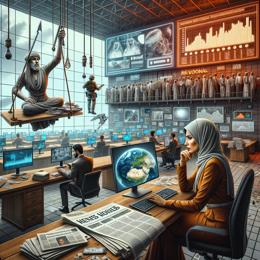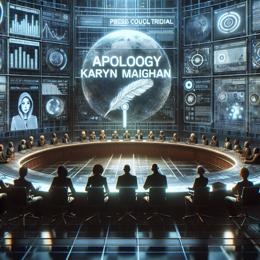Content created by AI
The Perilous Plight of Journalists Amidst Gaza Conflict
The escalating violence in Gaza, marked by airstrikes and military operations, has positioned journalists at the forefront of a hidden war—a war against the freedom of the press and the safety of media personnel. From the heartrending scene of Palestine TV journalist Salman al-Bashir mourning his colleague, to the binding limitations placed on international media organisations like CNN, the narrative is unambiguous: journalism in Gaza is under siege.
In a recent wave of violence, the death toll of media workers has climbed to an alarming figure. According to the Committee to Protect Journalists (CPJ), 63 journalists, predominately Palestinians, have lost their lives within a span of two months. The tragic stories unfold one after another; from Shima El-Gazzar of Almajedat network, to prominent figures like Issam Abdallah of Reuters, the losses underscore the peril journalists endure to document the conflict.
The starkly selective phrasing in media reports, distinguishing between Palestinian "deaths" and Israeli "killings," not only reflects the imbalance in the handling of the two parties but also conveys a subliminal message regarding culpability and victimhood.
The issue extends beyond the battlefield; insensitive political rhetoric from high-profile leaders further distorts public perception. President Biden’s skepticism about the Palestinian casualty figures reported by the Hamas-controlled Ministry of Health in Gaza, despite affirmations of their accuracy by international agencies, introduces a narrative of distrust that is quickly seized by media outlets.
U.S. and Israeli media play no small part in this phenomenon, as the demonization of Palestinians takes root through misleading rhetoric. This has tangible and at times devastating consequences, as seen in the tragedy of the Palestinian American family assaulted over a baseless, fear-induced "Global Day of Jihad."
Media ethicists, as well as advocacy groups like Honest Reporting, probe deeper to question whether Gaza-based photojournalists have ties to Hamas, given their seemingly prescient presence in conflict zones. Such suspicions have led Israeli Prime Minister Benjamin Netanyahu to label these journalists as complicit in crimes against humanity.
In response, an outcry from the journalism community is rising. A letter signed by 750 journalists worldwide calls for the protection of their peers and urges for candid and unflinching reporting that does not shy away from robust terms like "apartheid," "ethnic cleansing," and "genocide" to truthfully describe the situation. It's a plea for moral clarity and journalistic integrity in the face of adversity.
The international community and media watchdogs are now focused on a crucial question: will the mounting crisis prompt a shift toward better protection for journalists and acknowledgement of their indispensable role in crisis reporting, or will the opaqueness surrounding the Gaza conflict continue to shadow the truth?










